New Year in Japan By Kurilenko Daniil
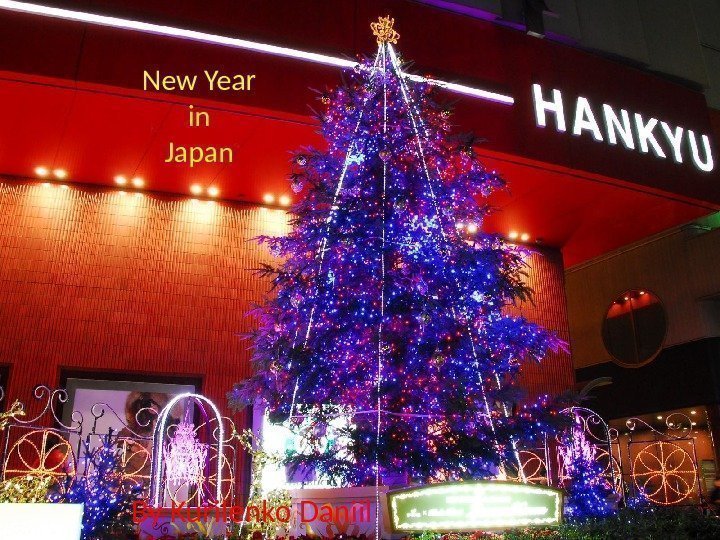
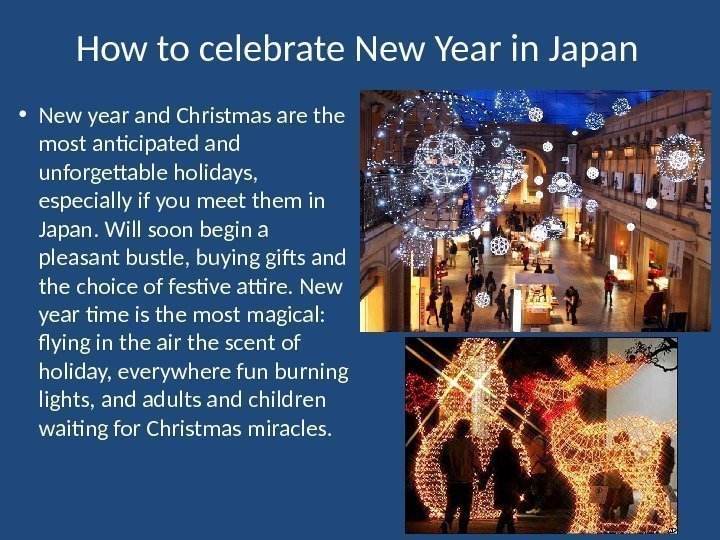
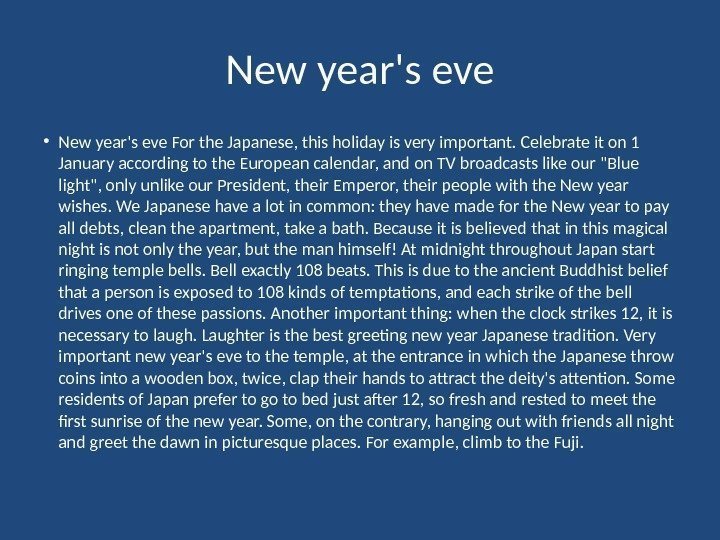
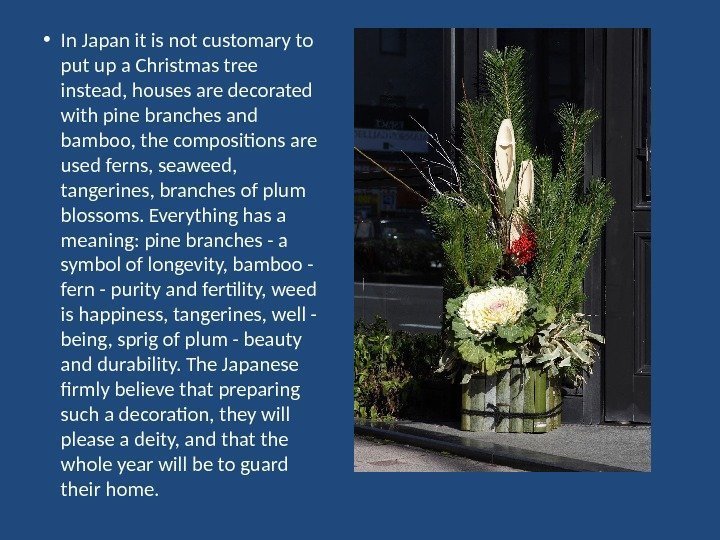
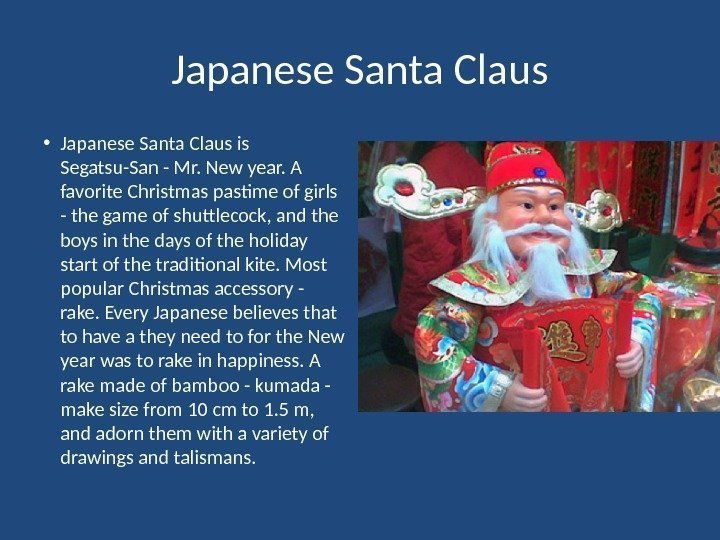
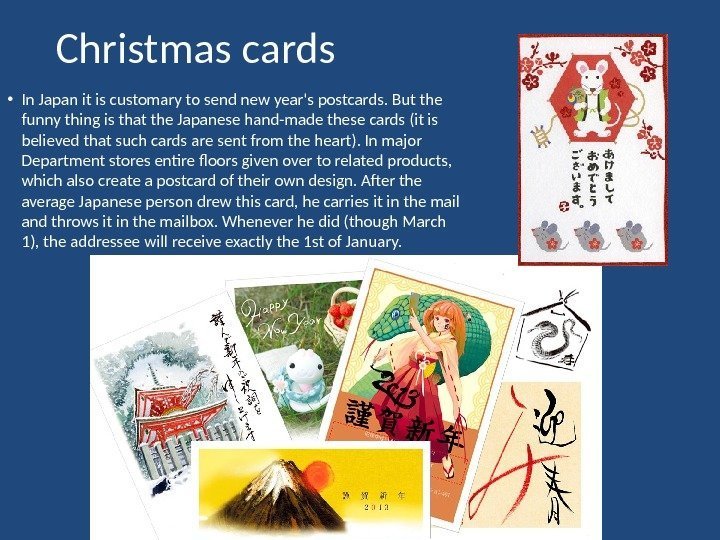
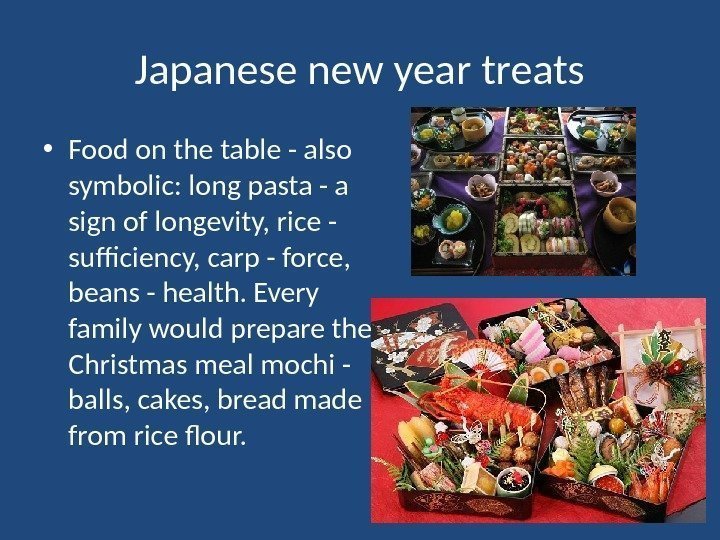
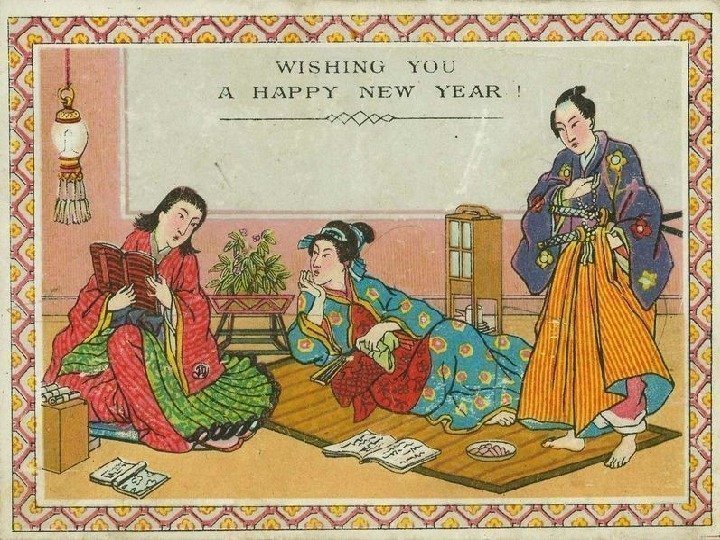
christmas_in_japan.pptx
- Размер: 2.4 Мб
- Автор:
- Количество слайдов: 8
Описание презентации New Year in Japan By Kurilenko Daniil по слайдам
 New Year in Japan By Kurilenko Daniil
New Year in Japan By Kurilenko Daniil
 How to celebrate New Year in Japan • New year and Christmas are the most anticipated and unforgettable holidays, especially if you meet them in Japan. Will soon begin a pleasant bustle, buying gifts and the choice of festive attire. New year time is the most magical: flying in the air the scent of holiday, everywhere fun burning lights, and adults and children waiting for Christmas miracles.
How to celebrate New Year in Japan • New year and Christmas are the most anticipated and unforgettable holidays, especially if you meet them in Japan. Will soon begin a pleasant bustle, buying gifts and the choice of festive attire. New year time is the most magical: flying in the air the scent of holiday, everywhere fun burning lights, and adults and children waiting for Christmas miracles.
 New year’s eve • New year’s eve For the Japanese, this holiday is very important. Celebrate it on 1 January according to the European calendar, and on TV broadcasts like our «Blue light», only unlike our President, their Emperor, their people with the New year wishes. We Japanese have a lot in common: they have made for the New year to pay all debts, clean the apartment, take a bath. Because it is believed that in this magical night is not only the year, but the man himself! At midnight throughout Japan start ringing temple bells. Bell exactly 108 beats. This is due to the ancient Buddhist belief that a person is exposed to 108 kinds of temptations, and each strike of the bell drives one of these passions. Another important thing: when the clock strikes 12, it is necessary to laugh. Laughter is the best greeting new year Japanese tradition. Very important new year’s eve to the temple, at the entrance in which the Japanese throw coins into a wooden box, twice, clap their hands to attract the deity’s attention. Some residents of Japan prefer to go to bed just after 12, so fresh and rested to meet the first sunrise of the new year. Some, on the contrary, hanging out with friends all night and greet the dawn in picturesque places. For example, climb to the Fuji.
New year’s eve • New year’s eve For the Japanese, this holiday is very important. Celebrate it on 1 January according to the European calendar, and on TV broadcasts like our «Blue light», only unlike our President, their Emperor, their people with the New year wishes. We Japanese have a lot in common: they have made for the New year to pay all debts, clean the apartment, take a bath. Because it is believed that in this magical night is not only the year, but the man himself! At midnight throughout Japan start ringing temple bells. Bell exactly 108 beats. This is due to the ancient Buddhist belief that a person is exposed to 108 kinds of temptations, and each strike of the bell drives one of these passions. Another important thing: when the clock strikes 12, it is necessary to laugh. Laughter is the best greeting new year Japanese tradition. Very important new year’s eve to the temple, at the entrance in which the Japanese throw coins into a wooden box, twice, clap their hands to attract the deity’s attention. Some residents of Japan prefer to go to bed just after 12, so fresh and rested to meet the first sunrise of the new year. Some, on the contrary, hanging out with friends all night and greet the dawn in picturesque places. For example, climb to the Fuji.
 • In Japan it is not customary to put up a Christmas tree instead, houses are decorated with pine branches and bamboo, the compositions are used ferns, seaweed, tangerines, branches of plum blossoms. Everything has a meaning: pine branches — a symbol of longevity, bamboo — fern — purity and fertility, weed is happiness, tangerines, well — being, sprig of plum — beauty and durability. The Japanese firmly believe that preparing such a decoration, they will please a deity, and that the whole year will be to guard their home.
• In Japan it is not customary to put up a Christmas tree instead, houses are decorated with pine branches and bamboo, the compositions are used ferns, seaweed, tangerines, branches of plum blossoms. Everything has a meaning: pine branches — a symbol of longevity, bamboo — fern — purity and fertility, weed is happiness, tangerines, well — being, sprig of plum — beauty and durability. The Japanese firmly believe that preparing such a decoration, they will please a deity, and that the whole year will be to guard their home.
 Japanese Santa Claus • Japanese Santa Claus is Segatsu-San — Mr. New year. A favorite Christmas pastime of girls — the game of shuttlecock, and the boys in the days of the holiday start of the traditional kite. Most popular Christmas accessory — rake. Every Japanese believes that to have a they need to for the New year was to rake in happiness. A rake made of bamboo — kumada — make size from 10 cm to 1. 5 m, and adorn them with a variety of drawings and talismans.
Japanese Santa Claus • Japanese Santa Claus is Segatsu-San — Mr. New year. A favorite Christmas pastime of girls — the game of shuttlecock, and the boys in the days of the holiday start of the traditional kite. Most popular Christmas accessory — rake. Every Japanese believes that to have a they need to for the New year was to rake in happiness. A rake made of bamboo — kumada — make size from 10 cm to 1. 5 m, and adorn them with a variety of drawings and talismans.
 Christmas cards • In Japan it is customary to send new year’s postcards. But the funny thing is that the Japanese hand-made these cards (it is believed that such cards are sent from the heart). In major Department stores entire floors given over to related products, which also create a postcard of their own design. After the average Japanese person drew this card, he carries it in the mail and throws it in the mailbox. Whenever he did (though March 1), the addressee will receive exactly the 1 st of January.
Christmas cards • In Japan it is customary to send new year’s postcards. But the funny thing is that the Japanese hand-made these cards (it is believed that such cards are sent from the heart). In major Department stores entire floors given over to related products, which also create a postcard of their own design. After the average Japanese person drew this card, he carries it in the mail and throws it in the mailbox. Whenever he did (though March 1), the addressee will receive exactly the 1 st of January.
 Japanese new year treats • Food on the table — also symbolic: long pasta — a sign of longevity, rice — sufficiency, carp — force, beans — health. Every family would prepare the Christmas meal mochi — balls, cakes, bread made from rice flour.
Japanese new year treats • Food on the table — also symbolic: long pasta — a sign of longevity, rice — sufficiency, carp — force, beans — health. Every family would prepare the Christmas meal mochi — balls, cakes, bread made from rice flour.

